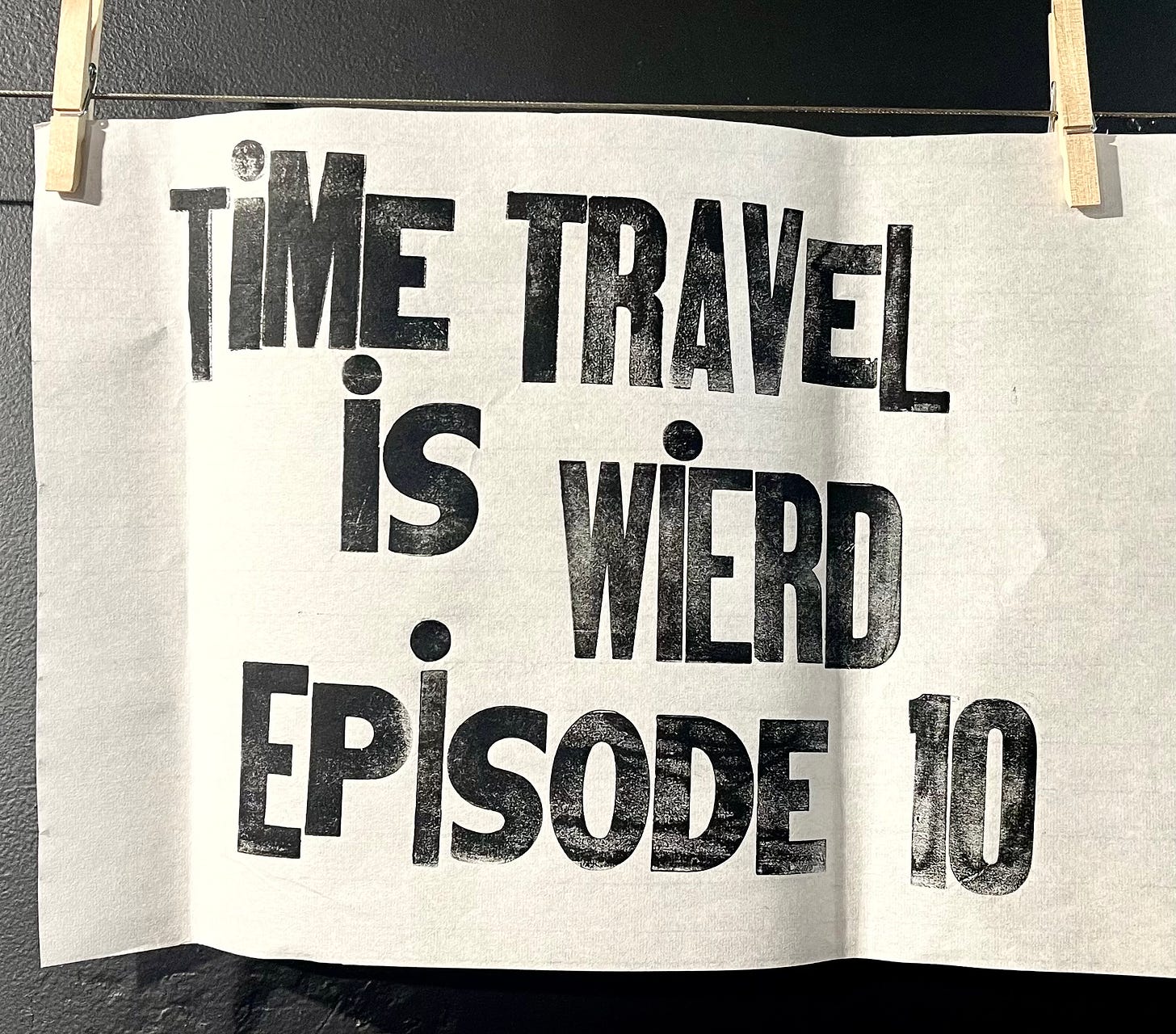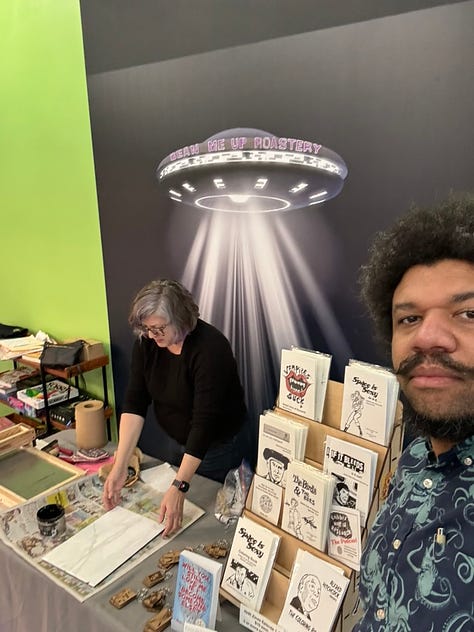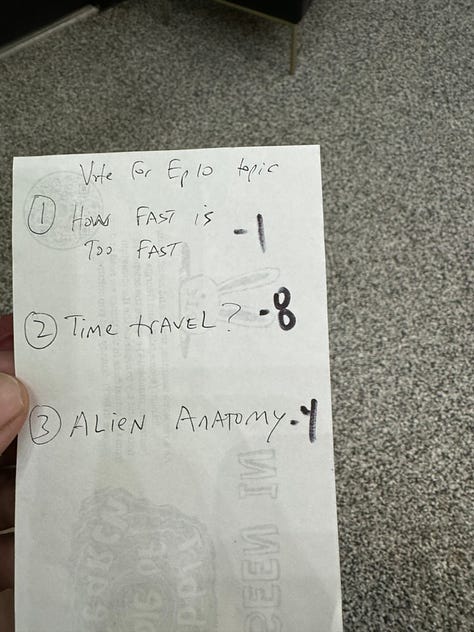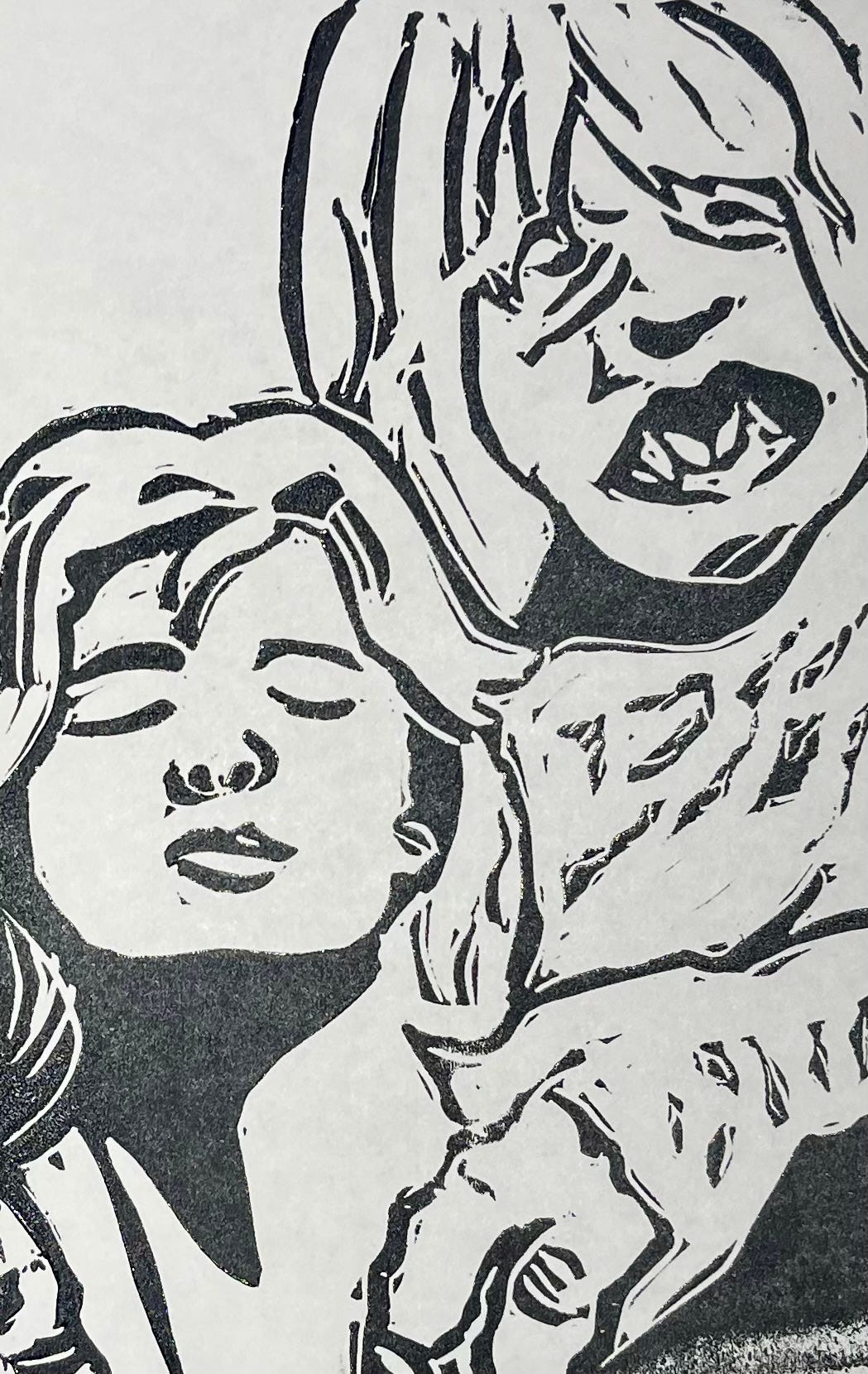The Show Notes: Rabbit Hole of Research Episode 10: Time Travel is Weird
Nick and I talk about the Event Horizon, Groundhog Day, Evil Dead, Somewhere in Time, Final Destination, Handwavium, Encyclopedia Britannica, Handwashing, Video Game logic and more spacetime stuff.

Episode 10: Time Travel is Weird
This has no particular format; it's just correcting or updating anything in the show we didn’t get a chance to fully talk about or things we had on the tips of our tongues and couldn’t get out as we recorded. As always, feel free to comment, and we will address stuff in future shows! Enjoy.
Don’t forget to Rate the show!
artwork by
@atomicnumber14 https://www.instagram.com/atomic_number14/Say hello and let us know:
If you traveled through time what Three Books would you take?
Favorite Time Travel Machine?
Is driving a car considered time travel?
What we drinking?
Nick and Joe shared a celebratory Leche Borracho: Bottle Logic Brewing
Images from the Fan Event held at Bean Me Up Roastery. And if you missed it, don’t worry we will do one again for our 1 year podcast anniversary!



Joe’s Show Notes:
Time travel: refers to the hypothetical concept of moving between different points in time, either forwards or backwards.
What is a black hole? a region of spacetime where gravity is so strong that nothing, including light and other electromagnetic waves, is capable of possessing enough energy to escape it.
What is a wormhole? a hypothetical structure connecting disparate points in spacetime, and is based on a special solution of the Einstein field equations
In Einstein's theory of general relativity, making a wormhole is pretty straightforward: You just build a black hole and connect it to a hypothetical white hole (which is the exact opposite of a black hole), and boom, there you have it: a tunnel through space-time.
What is a white hole? a hypothetical region of spacetime and singularity that cannot be entered from the outside, although energy-matter, light and information can escape from it.
What is spacetime? a mathematical model that fuses the three dimensions of space and the one dimension of time into a single four-dimensional continuum
The Year Ash ended up in Evil Dead 3 is 1300 AD: Army Of Darkness
We realized after recording it wasn’t Miracle on 34th street but It’s a Wonderful Life (the Christmas movie I was thinking about.)
HG Wells Time Machine movies; 1960 and 2002.
Is Final Destination a Time Travel Movie?
The Encyclopedia Britannica 15th edition with 32 volumes was last printed in 2010.
Kitty Pride Time travel by phasing.
The Flash time travel and the Multiverse.
Let The Ants Try. 1949 by Frederik Pohl (as James MacCreigh)
Young Marvels by Skottie Young, Dan Slott, Ruben Diaz
Earth has a rotational kinetic energy of 2.14×10^29 J. So You’d need a minimum of twice that much energy to stop and then start Earth rotating in the opposite direction.
History of time travel Movie (2014)
See You Yesterday (2019)Produced by Spike Lee
Horology: the study of time and the art of measuring it. It involves the design, construction, and maintenance of clocks, watches, and other timepieces.
Chronometry: the science of accurate time measurement
MYTHICAL REFERENCES TO TIME TRAVEL
Hindu mythology, the Vishnu Purana mentions the story of King Raivata Kakudmi, who travels to heaven to meet the creator Brahma and is surprised to learn when he returns to Earth that many ages have passed.
The Buddhist Pāli Canon mentions the relativity of time. The Payasi Sutta tells of one of the Buddha's chief disciples, Kumara Kassapa, who explains to the skeptic Payasi that time in the Heavens passes differently than on Earth.
The Japanese tale of "Urashima Tarō", first described in the Manyoshu tells of a young fisherman named Urashima-no who visits an undersea palace. After three days, he returns home to his village and finds himself 300 years in the future, where he has been forgotten, his house is in ruins, and his family has died.
In Jewish tradition, the 1st-century BC scholar Honi ha-M'agel is said to have fallen asleep and slept for seventy years. When waking up he returned home but found none of the people he knew, and no one believed his claims of who he was.
Early examples of Prolonged Sleep Time Travel
The Year 2440: A Dream If Ever There Was One, (1770) by Louis-Sébastien Mercier.
Rip Van Winkle (1819) by Washington Irving
Looking Backward (1888) by Edward Bellamy
When the Sleeper Awakes (1899) by H. G. Wells
Early examples of Backward Time Travel
Chinese novel Supplement to the Journey to the West (c. 1640) by Dong Yue features magical mirrors and jade gateways that connect various points in time
Samuel Madden's Memoirs of the Twentieth Century (1733) is a series of letters from British ambassadors in 1997 and 1998 to diplomats in the past, conveying the political and religious conditions of the future.
Charles Dickens's A Christmas Carol (1843) has early depictions of mystical time travel in both directions.
Early examples of Machine Based Time Travel
The Clock that Went Backward by Edward Page Mitchell,which appeared in the New York Sun in (1881).
Enrique Gaspar y Rimbau's El Anacronópete (1887) may have been the first story to feature a vessel engineered to travel through time.
H. G. Wells' The Time Machine (1895) popularized the concept of time travel by mechanical means.
Time Travel Paradoxes
1. Grandfather Paradox: As mentioned earlier, the grandfather paradox involves a time traveler going back in time and preventing their own grandfather from meeting their grandmother, thereby preventing their own birth. This creates a logical contradiction because if the time traveler prevents their own birth, they would not exist to travel back in time in the first place.
2. Bootstrap Paradox: In a bootstrap paradox, an object or information is sent back in time, creating a loop where the object's origin cannot be determined. For example, a person might travel back in time and give their past self a book containing information about the future. The question then arises: where did the book come from if it was never created?
3. Predestination Paradox: Also known as a causal loop, the predestination paradox occurs when a time traveler's actions in the past inadvertently contribute to the events they were trying to prevent. This paradox suggests that events are predestined to happen in a certain way, regardless of attempts to change them.
4. Ontological Paradox: Similar to the bootstrap paradox, an ontological paradox involves objects or information that exist without having a discernible origin. For example, a person might receive instructions or blueprints from their future self, allowing them to create a new invention. However, the question remains: who originally created the instructions if they were never created by anyone?
5. Twin Paradox: In the context of special relativity, the twin paradox arises when one twin travels through space at relativistic speeds while the other remains on Earth. When the traveling twin returns, they find that less time has passed for them than for their sibling. This paradox challenges our intuitive understanding of time dilation and the effects of relative motion.
The idea of reversing the rotation of the Earth to travel back in time—pure Handwavium
1. Conservation of Energy and Momentum: Reversing the rotation of the Earth would require an enormous amount of energy and would violate the principles of conservation of energy and momentum. Even if it were somehow possible to reverse the rotation of the Earth, it would not cause time to flow backward.
2. Time and Spacetime: In physics, time is considered a dimension of spacetime, and reversing the rotation of the Earth would not alter the direction of time. Time is a fundamental aspect of the universe that flows inexorably forward, regardless of the rotation or movement of celestial bodies.
3. Causality and Paradoxes: Even if it were possible to reverse the rotation of the Earth and somehow manipulate time, it would likely lead to paradoxes and inconsistencies in causality. The implications of reversing time would raise significant philosophical and theoretical questions about the nature of reality.

Okay, that’s it for this episode. How’d we do?
You can always email (I do answer back), click the comment link below, or follow me online for real time tracking.




